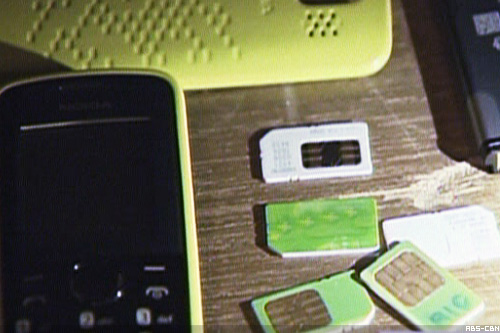Japanese among 11 arrested for SIM card 'cracking' | ABS-CBN
ADVERTISEMENT

Welcome, Kapamilya! We use cookies to improve your browsing experience. Continuing to use this site means you agree to our use of cookies. Tell me more!
Japanese among 11 arrested for SIM card 'cracking'
Japanese among 11 arrested for SIM card 'cracking'
Kyodo News
Published May 03, 2016 09:33 PM PHT
MANILA - A Japanese national and 10 Filipino employees of a technology firm operating in the suburban Philippine city of Makati have been arrested for illegally "cracking" mobile phone SIM cards to obtain free calls and Internet services, local police said Tuesday.
MANILA - A Japanese national and 10 Filipino employees of a technology firm operating in the suburban Philippine city of Makati have been arrested for illegally "cracking" mobile phone SIM cards to obtain free calls and Internet services, local police said Tuesday.
The Philippine National Police Anti-Cybercrime Group said Yusuke Otani, 32, a Japanese national, and 10 local employees of Tech Resource Inc. were apprehended during a raid at their office in Makati on Monday.
The Philippine National Police Anti-Cybercrime Group said Yusuke Otani, 32, a Japanese national, and 10 local employees of Tech Resource Inc. were apprehended during a raid at their office in Makati on Monday.
The arrests were made on the strength of a search warrant relating to 170 alleged violations of the country's cybercrime laws.
The arrests were made on the strength of a search warrant relating to 170 alleged violations of the country's cybercrime laws.
According to police, Tech Resource was using a Global System for Mobile Communications gateway to convert international calls to domestic calls through a process known as International Simple Resale, or the unauthorized routing and completing of international long-distance calls.
According to police, Tech Resource was using a Global System for Mobile Communications gateway to convert international calls to domestic calls through a process known as International Simple Resale, or the unauthorized routing and completing of international long-distance calls.
ADVERTISEMENT
Technology experts from the police said that, through a computer system, international long-distance calls were being connected by the company directly to local or domestic exchange facilities where the said calls are destined.
Technology experts from the police said that, through a computer system, international long-distance calls were being connected by the company directly to local or domestic exchange facilities where the said calls are destined.
Forty prepaid, domestic SIM cards were found to be connected to the Internet through the GSM gateway to process international calls and provide Voice Over Internet Protocol services, which include audio and video calls. More than 100 loose SIM cards were found and seized by the police.
Forty prepaid, domestic SIM cards were found to be connected to the Internet through the GSM gateway to process international calls and provide Voice Over Internet Protocol services, which include audio and video calls. More than 100 loose SIM cards were found and seized by the police.
"We are warning private companies that do not have the authority to operate using GSM gateways that they are damaging telecommunications companies in revenues and government taxes," Police Senior Superintendent Guillermo Lorenzo Eleazar said.
"We are warning private companies that do not have the authority to operate using GSM gateways that they are damaging telecommunications companies in revenues and government taxes," Police Senior Superintendent Guillermo Lorenzo Eleazar said.
The police official estimated that telecommunications networks lose at least 700,000 peso ($14,900) per month as a result of the illegal operations, excluding potential losses from free 24-hour Internet connections.
The police official estimated that telecommunications networks lose at least 700,000 peso ($14,900) per month as a result of the illegal operations, excluding potential losses from free 24-hour Internet connections.
Eleazar said the company was using a built-in signal jammer which controls signals from nearby cell sites to accommodate international calls. This wireless signal jammer has a 500-meter radius to absorb signals to strengthen incoming and outgoing calls, he said.
Eleazar said the company was using a built-in signal jammer which controls signals from nearby cell sites to accommodate international calls. This wireless signal jammer has a 500-meter radius to absorb signals to strengthen incoming and outgoing calls, he said.
Besides the SIM cards and the GSM gateway, police also seized other equipment being used by the company for evidence, including computers, routers, telephones, servers, laptops, CCTV cameras, cables, cellular phones and other documents believed to have been used for the illegal activity.
Besides the SIM cards and the GSM gateway, police also seized other equipment being used by the company for evidence, including computers, routers, telephones, servers, laptops, CCTV cameras, cables, cellular phones and other documents believed to have been used for the illegal activity.
The suspects will be charged for violating the Cybercrime Prevention Act of 2012, and could face jail sentences of at least six years and one day, plus a fine of at least 200,000 peso.
The suspects will be charged for violating the Cybercrime Prevention Act of 2012, and could face jail sentences of at least six years and one day, plus a fine of at least 200,000 peso.
Kyodo News approached Otani for a comment on the allegations, but the suspect declined to speak about the matter.
Kyodo News approached Otani for a comment on the allegations, but the suspect declined to speak about the matter.
ADVERTISEMENT
ADVERTISEMENT


